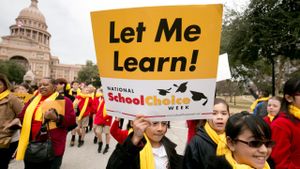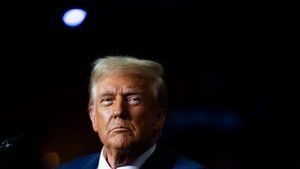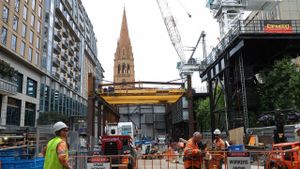Sri Lanka, the island nation situated just south of India, faces pivotal moments as it embarks on its first parliamentary election following the historic victory of President Anura Kumara Dissanayake. This election, held on November 14, 2024, is considered not just another routine political event but rather a litmus test for Dissanayake’s ambitious agenda to revitalize the economy and to place the needs of the impoverished at the forefront.
Dissanayake, who secured the presidency with nearly 43% of the popular vote earlier this year, is championing welfare policies to aid the populace, which is still grappling with the fallout from the severe economic crisis of 2022. His administration's roadmap includes promises to combat corruption, revise existing arrangements with the International Monetary Fund (IMF), and implement reforms without delay. His party, the National People's Power (NPP), previously held only three seats out of 225 in the parliament, prompting Dissanayake to dissolve the assembly early and seek public support.
With just over 17 million eligible voters, the recent election witnessed the participation of more than 8,800 candidates representing 49 political parties and 284 independent groups thronging across 22 electoral districts. Despite the impressive numbers, the competitive spirit of these elections has been marked by mixed activity, with many candidates at odds about how to adequately address the pressing economic issues affecting the country.
Voter sentiment on the ground reflects varied perspectives; Umeshi Perera, 32, expressed optimism, insisting on the potential for political change after Dissanayake's election: "I think we are seeing the first signs of a positive political change in Sri Lanka after the president was elected, and we should give him the chance to continue with these changes."
Conversely, voices from the opposition, such as Sajith Premadasa—leader of the Samagi Jana Balawegaya party—advocate for mixed economic policies to navigate the nation’s recovery path. Many voters remain deeply affected by incessant inflation rates, food scarcity, and high costs of living. The economy contracted significantly during the pandemic, heightening financial anxiety and showing signs of sluggish recovery post-IMF bailout.
The 2022 economic catastrophe, which led to the ousting of former President Gotabaya Rajapaksa, involved steep depreciation of the Sri Lankan rupee, foreign debt defaults, and substantial drops in foreign reserves. Although the IMF provided $2.9 billion to assist the recovering economy, Sri Lankans continue to feel underwhelmed by the pace of recovery.
"We haven't completely escaped the hardships brought about by the crisis, and people are worried about their day-to-day expenses," stated Manjula Devi, a garment factory worker. The impact of prolonged economic distress is articulated by the rise of poverty levels, with reports indicating it shot up to 25.9% over just four years.
Given these challenges, Dissanayake’s party promises to examine and adjust the terms of the IMF bailout, aiming to reduce income taxes and shift funds toward welfare projects for the needy. This move has sparked fears among investors and analysts about potential delay of future disbursements, which could hinder the country's ability to meet IMF targets like achieving a primary surplus of 2.3% of GDP by 2025.
The election’s results may prove momentous. Victory for Dissanayake’s NPP could bolster his ability to initiate sweeping reforms, but any setback could result in legislative deadlock, difficult to circumvent under the current system which mandates coalition politics where no single party can command majority control.
Despite the backdrop of economic distress, police reported peace at polling stations across the nation, thanks to security measures involving over 7,000 officers deployed to maintain order during the elections. Low-key campaigning surrounding the election contrasted sharply with previous turbulent political cycles, marking perhaps the first signs of political normalization.
The election format adopts proportional representation, ensuring the allocation of parliamentary seats aligns more closely with the percentage of votes obtained. Given this voting paradigm, political parties are compelled to collaborate, reinforcing coalition dynamics moving forward.
Both domestic and international observers are closely monitoring these elections, recognizing their potential to redefine Sri Lankan politics dominated traditionally by established families. The situation transcends mere politics; it intertwines deeply with the lives of millions who hope for effective governance leading to real change.
For Dissanayake, this election is more than just securing votes; it embodies the pursuit of redemption for the past disillusionment felt by voters. From the sum of societal grievances, a chance arises for his administration to steer the nation toward renewed hope, or it may open the pathway for opposition factions to rise amid dissent.
With results anticipated shortly after polling concludes, the aspirations and struggles of Sri Lankans hang delicately balanced on the outcome—a reflection of both present challenges and future potentials for change.



